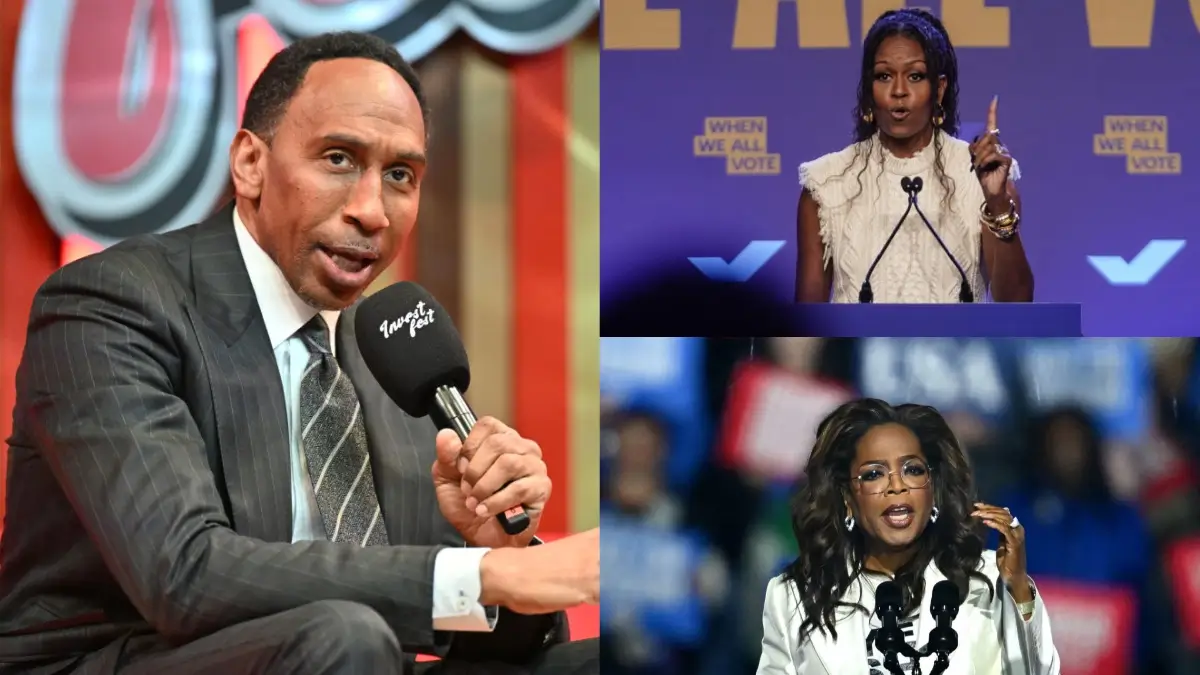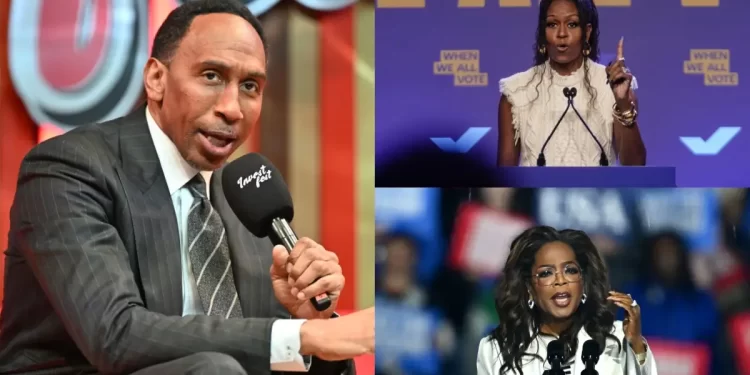Let the election blame game begin.
ESPN host Stephen A. Smith has cast his ballot in the post-election ritual of fingering someone, or something, as the reason their candidate lost, singling out Oprah Winfrey and Michelle Obama.
Smith said Wednesday on his “The Stephen A. Smith Show” podcast that the media mogul and former first lady set an exclusionary tone that alienated men (Trump’s most reliable voting bloc).


“If we don’t agree with you, we’re against you?“ said Smith, referring to speeches made by the media mogul and former first lady. “How do you think the men felt about that? So we have to do what you tell us to do; otherwise, we’re anti-you? You thought that worked? Do y’all know anything about most men? You think that’s going to work?”
Oprah and Michelle O. were among a long list of celebrities who endorsed Democrat Kamala Harris. She had the country’s most popular entertainers (Beyonce and Taylor Swift), most famous athlete (LeBron James), and two of its most iconic actors (George Clooney and Harrison Ford) on her side. Stars past (Madonna and Bruce Springsteen) and present (Charli xcx and Lizzo) all pledged their support for Harris.
But collectively, they were all just preaching to the choir, said Seth Abramovitch, senior writer at the Hollywood Reporter.
“Oprah, Katy Perry, Beyoncé, Lady Gaga, Madonna, Ariana Grande – these are artists whose audiences (black, female, liberal, queer) were already inclined to vote for Kamala,” he told The Guardian.
Swift, popular with country music and pop fans alike, would seem to be an exception, Abramovitch said, but her influence was negligible with two demographics that shifted significantly to Trump.
Of course, you could say the same for Trump’s celebrity endorsers. Non-white women, the demographic most resistant to the once and future commander-in-chief, were not going to be swayed by the likes of Hulk Hogan, Kid Rock and Lee Greenwood.
Left or right, the famous rarely, if ever, move the meter with voters.
“In the academic literature,” Arizona State University professor Margaretha Bentley, who has studied the cultural impact of Swift, said, “research has shown that, while celebrity endorsements can increase civic engagement and voter registrations, it has not proven to have a direct impact on how people make their voting decisions.”
When Swift endorsed Harris, she directed followers to the website vote.gov. Within 24 hours, the site received 405,999 visitors. But not all were swayed to cast their ballot for the former prosecutor and current vice president.
In fact, Swift may have hurt Harris more than she helped. A poll from YouGov, conducted shortly after her endorsement, found that only 8 percent of voters would be “somewhat” or “much more” likely to vote for Harris, far below the 20 percent of respondents who said Swift’s support would make them less likely to vote for the Democrat.
Harvard’s Ashley Spillane, who authored a study, “Celebrities Strengthening Our Culture of Democracy,” said it was impossible to quantify whether an endorsement from the famous leads to more votes for a candidate.”
That’s a change from the past. In 2008, a survey by Northwestern University found that Oprah’s endorsement of Barack Obama added around a million votes to his final tally.
But that was in less divisive times.
Smith argued it was Oprah’s message, not Oprah herself, that turned off male voters. Her Election Eve warning was that a second Trump term would herald an anti-democratic takeover of the U.S.
“This is the kind of stuff that alienates an electorate, alienates a voter,” Smith said. “Because the freedom that you tell them you have, you try to confiscate morally by letting them know, you ain’t worth a damn unless you vote the way we say you should vote.”
“Who’s going to go for that in a general election?” Smith asked. “With an economy rife with inflation, with over 12 million people crossing the border?”
The high-wattage endorsements also served to confirm digs from Republicans that the Democrats are the party of elitists.
“In the end, celebrities, who are worth hundreds of millions, if not billions, who most American citizens feel are incredibly detached from their way of life and their quality of life, were not going to get away and guilt them into doing something different than what their experience says is going on and what they should do about it,” Smith said.
The people most likely to benefit from a celebrity endorsement are the celebrity themself, said Laurence F. Maslon, an art professor at New York University.
“I think sometimes it’s a way to hitch your star to somebody who seems to be good for you, and maybe there’s a certain kind of reflected glory in that,” Maslon said.
British comedian Ricky Gervais may have said it best in a video he posted in June lampooning overly earnest stars who believe their political opinions truly matter.
“As a celebrity, I know all about stuff like science and politics so trust me when I tell you who you should vote for,” Gervais said. “If you don’t vote the right way, it’s like a hate crime and that makes me sad and angry and I’ll leave the country and you don’t want that.”







